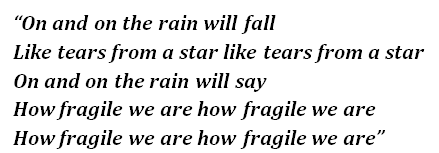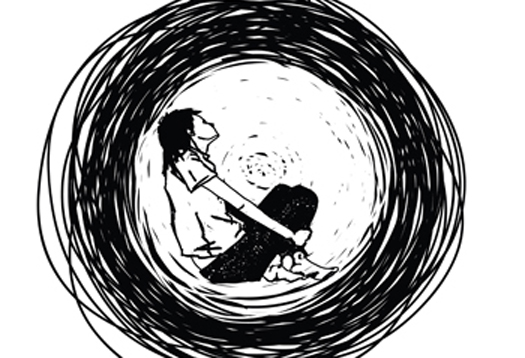'On and On How Fragile We Are...'
‘Life is so full of unpredictable beauty and strange surprises’

Words from Sting’s “Fragile” song. Photo: Song Meanings and Facts
Nota bene
Recently I read a very moving, powerful, and at times, fearful, distressing, but also hopeful article, written by a senior surgeon and academician in the US, speaking out about the rise in mental illness and suicides amongst physicians and surgeons in the US, by highlighting her own story and journey. More on this later.
For now, suffice to say, what I read resonated with me. I felt a sense of kinship and indigeneity with the story and the storyteller.
It took me back in time to the mid-1990s, when at the height of my career and professional achievements, similarly, but to a lesser degree, I also began to feel unwell, disappointed and confused, something that later on I discovered was not unique to me, but widespread amongst the faculty accros the universities the world over. Indeed, as I discovered more and more, I noticed that it was the same all over, with politicians of all colours, business leaders, the army, police, the entire health sector, teachers, social workers, you name it, the youth, even the children, the entire community.
At the time, a very sad moment for me was when I discovered the painful truth about the students that we, the faculty, were teaching, their pain, stress, distress, fear, anxiety, depression and very tragically, suicides. All these were becoming too uncomfortable, distressing and were getting too unbearable. I fell at a loss with myself and everything around me.
All in all, when I had the opportunity to retire early, I did so, so that I may try to cultivate and build a new life for myself, putting my experiences to good use and be of some value to others going through the same predicament. Below is how I had recalled those moments in earlier reflections.
The Story of My Life
As told by RUMI
‘I was ready to tell
the story of my life,
but the ripple of tears
and the agony of my heart
wouldn't let me.
I began to stutter
saying a word here and there
and all along I felt
as tender as a crystal
ready to be shattered.
In this stormy sea
we call life.
all the big ships
come apart
board by board.
How can I survive
riding a lonely,
little boat
with no oars
and no arms.
My boat did finally break
by the waves
and I broke free
as I tied myself
to a single board.
Though the panic is gone,
I am now offended.
Why should I be so helpless
rising with one wave
and falling with the next?
I don't know
if I am
nonexistence
while I exist,
but I know for sure
when I am
I am not
but
when I am not
then I am.
Now how can I be
a skeptic
about the
resurrection and
coming to life again.
Since in this world
I have many times
like my own imagination
died and
been born again.
That is why
after a long agonising life
as a hunter,
I finally let go and got
hunted down and became free.’
Below, once again, the wise master teacher, Rumi, distinguishes and explains the subtleties and diferences between intellectual and spiritual journeys:
‘The intellectual quest, though fine as pearl or coral,
is not the spiritual search.
The spiritual search is on another level;
spiritual wine is another substance!
The spiritual path wrecks the body
and afterwards restores it to health.
It destroys the house to unearth the treasure
and with that treasure builds it better than before.’
And thus, I started to tell my story:
‘As many people, wiser than me have noted, our lives and the world in which we all live, are so unpredictable. Things happen suddenly, unexpectedly. We want to feel we are in control of our own existence. In some ways we are, in some ways we're not ... Life, it can bring you so much joy and yet at the same time cause so much pain. We keep searching for happiness. Then, it becomes, somehow, an illusion, a mirage, because we fail and fail again to discover the true roots to happiness, what it is and what it entails.
'This is how I felt in the late 1990s. I was so devastated that after a wonderful personal, professional and academic journey, full of joy and happiness, achievements and success, due to some reasons beyond my control, reasons I could not see, I started to feel unwell, unhappy, not enjoying what I was doing and teaching, especially, when I lost all confidence in the value of moral-free economics that I was teaching my students, and more. This is why today I am encouraging and inviting those with power to affect change, to formulate courses, programmes and degrees on the art and science of happiness at our universities the world over,' and thus I began my story and journey…’- Kamran Mofid
Also see:
Economics, Globalisation and the Common Good: A Lecture at London School of Economics
Oxford Theology Society Lecture: Values to Make the World Great Again
Global Crises are Spiritual: A Time for Awakening
My Economics and Business Educators’ Oath: My Promise to My Students
A couple of years after my retirement, in my new journey of self-discovery, I began to write about these issues widely, highlighting the pain, suffering, the stigma that surrounds depression, anxiety, panic attack and the unbearable guilt felt by those suferring and confronting these kinds of feelings, and above all the loneliness and the isolation that the sufferer feels in these circumstances.
All said and done, in order to save myself and be of any help to others, I needed to talk, write and share my feelings and my journey to healing.
I think, the first article that I had written about my experiences was the one in January 2011: ‘Why Happiness Should be Taught at Our Universities’
‘Just for a moment stop and think about this timely and pertinent question: How is it that there is a field of study for economics, business, management, politics, international studies, psychology, engineering, computer, IT, history, journalism, medicine, geography, town planning, you name it, but nothing on life planning, there is no field of study for happiness, who are we, where have we come from, where are we going to, what’s the purpose of this journey we call life? Are these not some of the most important questions known to humans? Questions that if we fail to find answers to, will lead to our catastrophic failure to discover what it means to be human,’ I began to write. Why Happiness Should be Taught at Our Universities
Also see:
Student Suicides at Bristol University: My Open Letter to the Vice-Chancellor, Prof. Hugh Brady
An Open Letter to University Leaders: Students’ Mental and Emotional Wellbeing Must Be Our Priority
I wrote and wrote many more articles, and delivered many talks and lectures on my journey, which I will share with you a bit later.
Now, I wish to revert to the article I had mentioned earlier on why so many physicians and surgeons are killing themselves in the US, which as we all know is not unique to the US or indeed to the health sector alone.
‘US surgeons are killing themselves at an alarming rate. One decided to speak out’

Photo: Anna Parini/ via The New York Times
‘The grueling profession has long kept silent about mental distress. After losing a friend and quietly grappling with illness, Carrie Cunningham found a new way to save lives.’

The surgeon Carrie Cunningham at Massachusetts general hospital.
Photograph: Kayana Szymczak/The Guardian
‘Carrie Cunningham puffed out her cheeks and exhaled. She looked out at the audience filled with 2,000 of her peers, surgeons who were attending the annual meeting of the Association of Academic Surgery, a prestigious gathering of specialists from universities across the United States and Canada.
Cunningham, president of the organization, knew what she was about to reveal could cost her promotions, patients and professional standing. She took a deep breath.
“I was the top junior tennis player in the United States,” she began. “I am an associate professor of surgery at Harvard.
“But I am also human. I am a person with lifelong depression, anxiety, and now a substance use disorder.”
The room fell silent.
Cunningham knew others in the room were struggling, too. Doctors are dying by suicide at higher rates than the general population. Somewhere between 300 to 400 physicians a year in the US take their own lives, the equivalent of one medical school graduating class annually.
Surgeons have some of the highest known rates of suicide among physicians. Of 697 physician suicides reported to the CDC’s national violent death reporting system between 2003 and 2017, 71 were surgeons. Many more go unreported.
For years, no one in surgery talked publicly about mental distress in the profession; surgeons have long experienced a culture of silence when it comes to their personal pain. They have a reputation as stoic, determined and driven. They are taught, throughout a decade of grueling training, to dissociate themselves from their body’s natural cues, telling them that it is time to rest, eat or urinate.
The patient’s needs always come first – that’s part of what makes a good surgeon. But this approach can have consequences for a surgeon’s own mental health.
Cunningham had already lost one friend to suicide. She decided that if her job was to save lives, she would begin with her own and those of her colleagues.
She started to tell her story…’- Read the story here
Healing and Nurturing Mental Health, Cultivating Inner-peace, Contentment, Joy and Happiness: A pick from our GCGI archive
“A different world cannot be built by indifferent people.”

Photo: futurity.org
(In the postings below, amongst many others, I have tried to discuss and debate our children, youth, pupils, students, faculty and many other professionals’ welfare and wellbeing, by combining my own experiences, knowledge, insight, and education.)
A Plea to address Global Youth Depression
Student Suicides at Bristol University: My Open Letter to the Vice-Chancellor, Prof. Hugh Brady
Neoliberalism and the rise in global loneliness, depression and suicide
Eruption of anxiety, depression and suicide in Britain
An Open Letter to University Leaders: Students’ Mental and Emotional Wellbeing Must Be Our Priority
It’s All in The Mind: Focus on Mental Health
Success-What is it and is the drive to achieve it making our children sick?
Good on you Ms. Essena O'Neill: Social media 'is not real life'
“We’re teaching our kids wrong: They worship wealth and celebrities”
Nature the Best Teacher: Re-Connecting the World’s Children with Nature
Life Lessons I've Learned in a World of Conflicting Ideas and Aspirations.
These are the times when we desperately need inspiring and healing words of wisdom, hope and beauty.
A Gift from our GCGI archive to help set us free from chaos and despair, so that we may achieve inner peace and spiritual calm, a more generous and rewarding imagination, inspiring and empowering us to take action in the interest of the common good.
Journey to Healing: Let Me Know What is Essential
Envisioning the Future of our Children’s Education
To reverse the current destructive path and begin the task of healing, we need a different education model and we need a different economic value and economy. However, these are not possible to achieve so long as The Fraudulent Ideology reins supreme. Full stop. Carpe Diem!
This is my call to anybody, everybody in a position of power to instigate change:
1- Introduce and Connect the Children and the youth with Mother Nature
Nature the Best Teacher: Re-Connecting the World’s Children with Nature
2- Introduce and connect them to poetry
Poetry is the Education that Nourishes the Heart and Nurtures the Soul
3- Introduce and connect them to the healing power of music.
Playing for Change: How music can change the world!
4- Teach them the Economics of Kindness Not the Economics of the Rat Race
Wouldn’t the world be a better place with a bit more kindness? Harnessing the Economics of Kindness
What if Universities Taught KINDNESS?
Calling all academic economists: What are you teaching your students?
5- Teach them about Emotional Literacy
Why We All (Children and Grown Ups) Need Emotional Literacy, Now More than Ever
6- Teach them the art of Simplicity and Living a Simpler Life
Simplicity: it’s our true guide to a better life
The beauty of living simply: the forgotten wisdom of William Morris
In Praise of ‘Enoughness’ and 'Lagomist' Economy
The Number One Message of Lockdown
I am doing Nothing, how about you?
In this troubled world let the beauty of nature and simple life be our greatest teachers
7- Teach them the art of Happiness and what it means to be Happy
Wisdom of Lao Tzu: The Path to Virtue, Happiness, and Harmony
Are You Still Searching for Happiness?
Why Happiness Should be Taught at Our Universities
8- Teach them What it Means to be Human and What Makes us Human
Have We lost the Art of Knowing What it Means to Be Human?
Yes, it is true: “Education is what makes us fully human”
Come and meet the Team Human, My Favorite Team
Build a Better World: The Healing Power of Doing Good
Journey to Healing: Let Me Know What is Essential
A Happier and a more Fulfilling and Rewarding Life is Possible

Photo: Via Pinterest
Here you have it. Let us rise to this global challenge. Let us come together for the common good, suggesting possible solutions, envisioning a better life for all, enabling and empowering each other to lead a more fulfilling and happier life.
The opportunity is upon us. Let’s size it. Carpe Diem!
GCGI is our journey of hope and the sweet fruit of a labour of love. It is free to access, and it is ad-free too. We spend hundreds of hours, volunteering our labour and time, spreading the word about what is good and what matters most. If you think that's a worthy mission, as we do—one with powerful leverage to make the world a better place—then, please consider offering your moral and spiritual support by joining our circle of friends, spreading the word about the GCGI and forwarding the website to all those who may be interested.
